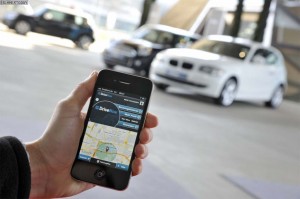BMW is plugging into the nascent electric vehicle market. But that doesn’t mean it’s all that charged up about the technology’s opportunities, especially in the U.S., near-term.
Perhaps the best opportunity to create a market, the maker appears to be betting, is through non-traditional marketing efforts, such as the new DriveNow car-sharing service it has partnered with in San Francisco.
Without significant new incentives, senior BMW executives caution, direct EV sales to consumers will likely remain little more than an asterisk on the sales charts.
With little fanfare, BMW quietly began letting DriveNow begin renting out its new 3-Series-based ActiveE battery-electric vehicle in late June. At a growing number of automated locations in the city – with a center coming at San Francisco International Airport – motorists can pick up an ActiveE and use it for as little as a half hour or keep it for several days.
Like other car-sharing services, DriveNow hopes to appeal to urban dwellers or mass transit commuters who might find the need for occasionally using a car, say, to get to the airport, or to go shopping. After paying a $39 registration fee, the battery-based ActiveE will rent for $12 for the first half hour. After that, customers will pay a per-minute rate that varies depending upon whether they are parked or driving, with a maximum charge of $90 a day.
“Our introduction of these services in San Francisco represents BMW’s commitment to encouraging the development of new mobility options that will reduce emissions and congestion and improve the quality of life for San Franciscans,” BMW’s global marketing chief Ian Robertson said during a formal announcement of the DriveNow program this week.
BMW is also partnering with ParkNow, a system that allows motorists to use a smartphone app to find and reserve a parking spot around the city, avoiding the frustrating search for an available space.
“We’re looking at adding more vehicles – and more cities,” Rich Steinberg, the BMW executive overseeing the DriveNow program told TheDetroitBureau.com during a dinner interview. “We’ve not fully decided” how broad the program will expand, he added, though a number of possible markets are under consideration, including “green-minded” cities on both the East and West Coasts.
BMW isn’t the only maker looking to place its battery cars into rental or car-sharing services. Other makers, including Ford, Nissan and Mercedes-Benz have been teaming up with rental operations as diverse as traditional Hertz and up-start ZipCar.
Such moves present a number of potential advantages. For one thing, it gets vehicles like the ActiveE and Nissan Leaf into the public eye and lets potential customers try them out with relatively little risk.
Meanwhile, manufacturers are closely tracking the way such vehicles perform on the road, keeping an eye on range, charging times – and how renters actually use the vehicles. Do they charge overnight, for example, or plug into public charging facilities during the day.
Such information could help makers like BW improve their battery-based offerings in the future to enhance their functionality and appeal.
Virtually every major manufacturer is now readying a battery car for the market – if for no other reason than to meet government mandates. But while a few companies, notably Nissan, are bullish about the potential of EVs, most automakers are less optimistic.
BMW will not only offer an ActiveE version of the 3-Series but is getting ready to add hybrid-powered models of its 3-, 5- and 7-Series lines. It’s also readying an all-new battery-car brand-within-a-brand that will debut with the battery-electric i3 model due out in about a year. A plug-in hybrid sports car, the i8, will follow soon afterwards.
Ludwig Willisch, CEO of BMW North America, believes the hybrids have a good opportunity to gain sales momentum. The maker will “absolutely” go after upscale buyers who now like to park a Toyota Prius alongside a BMW or some other luxury car, he suggested during an interview with TheDetroitBureau.com.
But when it comes to pure battery-electric models, like the i3, he is less upbeat, warning that without the “advantages of legislation,” such as lucrative new tax breaks or other incentives, battery cars will take a long time to gain traction.
“We’ll probably sell quite a few in California and a few other states,” but on the whole, “it’ll just be four digits,” or mere thousands, rather than the 100s of thousands of gas-powered vehicles BMW currently sells in the North American market.

